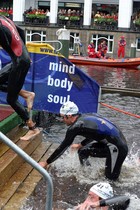 Something that is “systematic” is characterized by order and planning. A systematic approach means methodically following a fixed plan step by step.
Something that is “systematic” is characterized by order and planning. A systematic approach means methodically following a fixed plan step by step.
For the triathlete, a systematic approach to training will best enable you to accomplish your goals, while minimizing the risk of injury.
First, Examples Of Unsystematic Training
There are all kinds of ways triathletes test the wisdom of systematic training.
Typically, they pay the price for doing so.
For example, when I first began doing triathlons I set unrealistic goals. I was convinced I’d be the exception to the rule, and would progress to a level in about half the time it took most triathletes. "I’ll show them!" I thought to myself.
Well, it was the same old song; overtraining led to injury and instead of half the time, it took twice as long.
On another occasion, I had become sloppy in my training, and I was doing much more biking than running. With a few weeks left before a major race, I realized my need to pick up my run mileage. I had not run more than about 10 miles for quite awhile, but decided I’d go out and run 16.
To make matters worse, while on this particular run (which was mostly on a Nashville greenway), another runner flew past me. So, I did what any mature, level-headed, sensible adult would do. I decided to chase her! I tried to keep up with her blistering pace, hoping to eventually pass her. I never did catch her, but I strained my groin trying, and it was a significant setback to my triathlon training.
Can you see just how unsystematic this training session was?
First off, I increased my mileage too high too quickly because I had not been putting in enough miles running. Nor did I have any plan for a training pace other than trying to chase the girl who whizzed past me.
Don’t Let This Happen To You
Here are some common signs of unsystematic training:
1. A hit-or-miss mentality with stretching and strength training.
2. Determining your training sessions on the fly in terms of what you do, the mileage, and intensity level or pace.
3. More or less doing the same thing each time you swim, bike, or run.
4. Having only a general or vague sense of how many miles you are doing weekly in each area.
5. Switching your day off or not having a day off at all.
6. Not taking nutrition and sleep seriously.
7. Having no written account or log, charting your training plan and progress.
8. Procrastinating about the specific triathlon events you plan to train for and compete in.
9. Only doing individual training sessions, and not incorporating group swims, rides, and runs.
10. Not giving proper attention and training to swimming, biking, and running technique.
11. Being easily swayed away from your plan into what others are doing.
Systematic Training Done Properly
 The two most important aspects of establishing a systematic triathlon training plan are learning the science of triathlon training, and establishing a year-round triathlon training mentality.
The two most important aspects of establishing a systematic triathlon training plan are learning the science of triathlon training, and establishing a year-round triathlon training mentality.
Think of triathlon training as a science involving several critical components. The first task is to become educated about this science. There are many resources to help you do this. Joe Friel’s book The Triathlete’s Training Bible condenses that science into a helpful user-friendly tool for establishing a sound triathlon training plan.
Triathlon training is a year-round endeavor, based on the principle of periodization. The world is filled with people beginning and discontinuing all kinds of fitness and workout programs. The typical YMCA is flooded with new members in the spring as people want to drop weight and look good for the summer, and then in late fall the numbers drop off considerably and people become inactive during the winter. A triathlon training plan will keep you at a high fitness level year round.
All sports involve year-round preparation. Take football…
- There’s an “off-season,” which mostly involves building a high level of fitness and strength training.
- Then there’s “training camp,” which focuses a lot on skill development, as well as learning and executing formations and plays.
- The “pre-season” consists of putting practice into action in game-like scenarios, all building toward a fine-tuned readiness for the official season.
- The season consists of a schedule of weekly games, and continuing practices.
- Following the season, a period of recovery and rest takes place, and it starts all over again in the “off-season” phase.
Triathlon training also progresses through stages throughout a year. A general overview is as follows:
-
Base Period – Developing an endurance base in each area — swimming, biking, and running — with some speed training. Normally an 8 to 12 week period.)
-
Build Period – Intensity training, as well as competing in triathlon events chosen specifically as preparation for a later priority event(s). 6 to 8 weeks.
-
Peak Period – Final race-readiness preparation, and tapering. 1 to 2 weeks.
-
Race Period – Competing in key triathlon events, and maintaining personal strengths. 1 to 3 weeks.
-
Rest and Recovery Period – 1 to 6 weeks.
-
Preparation to Train Period – 3 to 4 weeks.
In each period, the objectives are broken down into a weekly training plan, including the number of hours spent in training each week and the specifics of what you do in each session.
How To Start Systematic Training
There are many triathlon training plans offered on the Internet, some are more detailed and sophisticated than others.
Many of these plans assume you have already invested the necessary time in building an endurance base, there
fore the plans are much shorter — such as this 16-week plan for competing in an Olympic distance triathlon.
Some of these plans are free, others you pay for. Many triathletes maintain an online training log to chart their progress.
So, if you don’t have a systematic triathlon training plan right now, do not pass Go, do not collect $200 until you have invested the time and energy to learn the science, and you are holding in your hand an annual triathlon training plan that you have created for yourself and committed to following weekly.
I’m over 40 years old, but I don’t give up easily. It wasn’t too long ago that I was exploring the idea of doing my first triathlon. If I can do it, you can too! I'm proof that with a little determination and training, you can get a great deal of fulfillment participating in marathons, triathlons… even ultramarathons.




